Virtual visits from the UVic Speakers Bureau
Looking for an engaging speaker for an event this fall? Keep an eye on the UVic Speakers Bureau. This group of UVic volunteers are going online to bring their research to the community.
The UVic Speakers Bureau is a community service provided by faculty, staff, graduate students and retirees who teach, conduct research, study and work at UVic. Throughout the year, this group of experts is available to speak to community groups, schools, clubs and other organizations.
This fall, the bureau is offering virtual talks to accommodate COVID-19 health regulations. Over the summer, we’ll introduce a few of the speakers here on The Great Indoors so you can get a taste for what to expect this fall.
Simon Devereaux, History
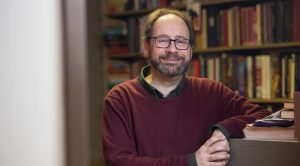 Hit the books with Simon Devereaux in The Golden Age of the Detective Novel. Deveraux discusses how three English mystery writers of the interwar era -Agatha Christie, Dorothy L. Sayers, and G. K. Chesterton- interpret their time and how we, as historians, can interpret that.
Hit the books with Simon Devereaux in The Golden Age of the Detective Novel. Deveraux discusses how three English mystery writers of the interwar era -Agatha Christie, Dorothy L. Sayers, and G. K. Chesterton- interpret their time and how we, as historians, can interpret that.
Miss Marple, Lord Peter Wimsey, Father Brown and other sleuths question the romantic yearnings for smaller communities, old certainties of religion, England’s place (or perhaps displacement) within Europe, among other things, all with a comedic flair.
“Sherlock Holmes speaks to preoccupations with science and confidence in science,” says Deveraux. “But the First World War as a cultural event demolishes all of that confidence so that the detectives of the interwar era are moving away from a world of pure reliance upon reason.”
“We can situate the mystery novels as sort of a yearning for an ordered universe at a time when people really deeply doubted such a thing existed anymore.”
Devereaux says his foray into murder mysteries actually comes from an interest in true crime. This talk is an adapted lecture from the third-year course ‘Homicide in Britain’ which investigates the changing character and extent of homicide in England from the eighteenth century to the present day.
“My job is to convey enthusiasm. To find a topic that I’m really enthusiastic about and show why it has a history—and everything has a history! I don’t expect my students to remember everything, but I would hope that they have picked up a pattern of thinking and a kind of enthusiasm of their own and an impatience with being told by somebody else just to accept or receive wisdom. The best thing that we do in humanities in general is make people into better critical thinkers and hopefully better citizens.”
Devereaux adds five new talks on conspiracy thinking to the bureau this season, adding to his collection of murder, governance and the royal family.
Cody Poulton, Pacific & Asian Studies
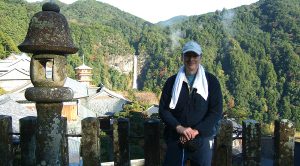
Cody, Nachi Shrine, Kumano
Dr. Cody Poulton offers six talks in the field of Pacific & Asian Studies. One of the most popular by far is Hiking in Japan: The Old Roads of Kumano, offered in both English and Japanese.
“Often it’s elderly people who ask me to come talk about hiking,” says Poulton, “or people who are recovering from strokes. It’s armchair travel. We’re all doing that at the moment if we’re doing any traveling whatsoever.”
The Ancient Road of Kumano is a network of old pilgrimage routes in Japan, south of Osaka and Kyoto. For over 1,000 years people from all walks of life—emperors to commoners—made the trek to the three shrines of Kumano Sanzan (Kumano Hongu Grand Shrine, Kumano Hayatama Grand Shrine, and Nachi Grand Shrine).
Twinned with Spain’s Camino de Santiago, the UNESCO world heritage site is extremely popular with trekking travelers.
“In Japan the mountains are not necessarily high, but they are very steep,” notes Poulton, “The highest places in those regions are around 2,000 metres so it is a slog to get to some of these places. It’s fairly respectable and quite wild. It’s a nice place to go to when one wants to get out of the maddening crowd of urban Japan.”
Poulton started his academic journey in Greek and Roman studies, but quickly left Greece and Rome behind after a few courses in pacific studies and a study abroad program in Japan.
“We live in a very international world. Our culture—Canadian culture—is very multi-cultural. It’s increasingly non-European. I think it’s important for us to decolonize humanities. One way of doing that is to get out of the European orbit and look at civilizations around the world that are not traditionally considered to be part of our western heritage. I think that’s probably been one of my perennial mandates as an educator: to look at the value of the study of cultures that are not necessarily our own and what the intrinsic value of those cultures are and what they can bring to people like us.”
Sonia Voicescu, Environmental Studies
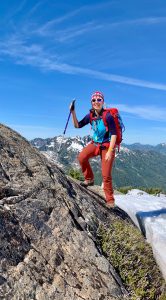 Sonia Voicescu, environmental studies Speakers Bureau expert, gave her final presentation of the 2019/20 season over Zoom. She is excited for more virtual visits when the new season kicks off in September.
Sonia Voicescu, environmental studies Speakers Bureau expert, gave her final presentation of the 2019/20 season over Zoom. She is excited for more virtual visits when the new season kicks off in September.
The graduate student loves communicating her research: “It’s an incredibly essential skill for anybody going further in academia, or anywhere really,” she says. Away from campus, her conversations have varied from horticultural questions posed by local community groups to geoanalysis debates with the Air and Waste Water Management Association.
Sonia offers two talks. In the first, Butterflies of Southern Vancouver Island, she outlines the biology of a butterfly, why our local species are threatened and what we can do to help. This topic is a fan favorite for horticulturists as Sonia outlines how to make your own butterfly garden!
Butterflies is based on Sonia’s research for habitat restoration for the Vancouver Island Ringlet, a small but mighty orange and brown butterfly who usually reside in Garry Oak meadows. It was her final project for the Restoration of Natural Systems Diploma.
Sonia presents her current research with the Mountain Legacy Project in her second talk, The Use of Repeat Photography in Ecological Restoration. The team recaptures historical photos first taken by mountain surveyors from 1861 to 1958 in order to examine the ecological changes. There are approximately 120,000 photos and the team has recaptured about 9,000 of them. We shared a post about the project a few weeks ago.
Visit the Speakers Bureau website for more topics and learn how you can book a speaker.

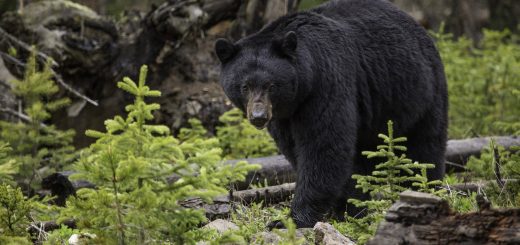
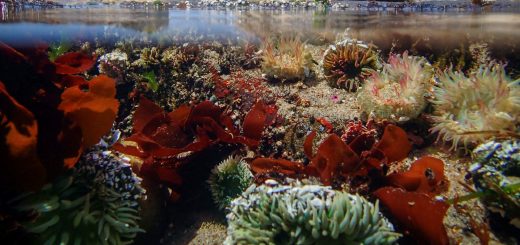
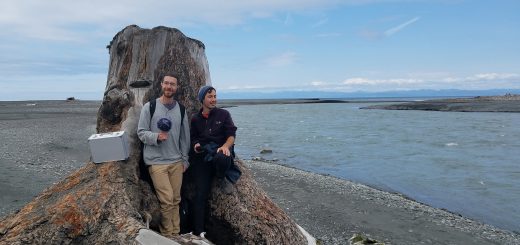
I am interested in speakers who may be available to talk via Zoom to a group of approximately 25 Probus members that are part of a current Affairs group. They meet monthly but because of Covid can now only meet and discuss via Zoom.
Thanks for your interest! We’ll put you in touch with the Speakers Bureau organizers by email. Stay tuned.